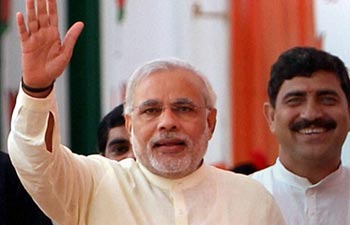Mumbai, Apr 14: Hours after Prime Minister Narendra Modi announed extension of the coronavirus-enforced lockdown till May 3, a large number of migrant workers who earn daily wages came out on road in Mumbai on Tuesday demanding transport arrangements to go back to their native places.
Bandra in Mumbai right now. Police probing what caused such a large crowd to gather. pic.twitter.com/04H1Mnggd2
— Padmaja joshi (@PadmajaJoshi) April 14, 2020
Daily wage workers have been rendered jobless ever since the lockdown was announced late last month to stem the spread of COVID-19, making their life a constant struggle.
Though authorities and NGOs have made arrangemnets for their food, most of them want to go back to their native places to escape the hardship brought by the sweeping curbs.
Wow. Thousands of ambassadors of peace doing this at #Bandra right now. Well done @OfficeofUT, well done. The world should see this.#Covid_19 #COVIDIOTSpic.twitter.com/SdinaZXm39
— Abhijit Majumder (@abhijitmajumder) April 14, 2020
According to a police official, daily wage earners, numbering around 1,000, assembled at suburban Bandra (West) bus depot near the railway station and squatted on road at around 3 pm.
The daily wage earners, who reside on rent in slums in in the nearby Patel Nagri locality, were demanding arrangement of transport facilities so that they can go back to their native towns and villages.
They originally hail from states like West Bengal and Uttar Pradesh.
Thousands of migrants gather at Mumbai's #Bandra railway station and protested. All are migrant workers, specially from Bihar-Bangal and they wanted to go home. They had hoped trains will start today. The police is investigating the matter and says crowd has been dispersed now. pic.twitter.com/NMHfv0CEpj
— Shivangi Thakur (@thakur_shivangi) April 14, 2020
One of the labourers, who did not reveal his name, said, NGOs and local residents are providing food to migrant workers, but they want to go back to their native states during the lockdown which has badly affected their source of livelihood.
"Now, we dont want food, we want to go back to our native place, we are not happy with the announcement (extending the lockdown)," he said, looking dejected.
Asadullah Sheikh, who hails from from Malda in West Bengal, said, We have already spent our savings during the first phase of the lockdown. We have nothing to eat now, we just want to go back at our native place, the government should made arrangements for us.
This happened in bandra just minutes back ! This can be potentially dangerous. Mumbai anyways is a hotspot ! What is the @MumbaiPolice and @OfficeofUT doing ???? Did @uddhavthackeray not provide food and shelter to such migrants ? #mumbai #UddhavThackeray #Lockdown2 pic.twitter.com/AeSuqbwhyN
— Megha Prasad (@MeghaSPrasad) April 14, 2020
Another labourer, Abdul Kayyun, said I am in Mumbai for last many years but have never seen such a situation. The government should start trains to shift us from here to our native place."
Heavy police deployment was made at the protest site to tackle any untoward incident.
Personnel from other police stations were called at the spot to maintain order, the official addd.
 Jaipur, Sep 10: Narendra Modi is due in Jaipur today to launch the BJP's campaign for the elections in Rajasthan. He will address a rally with BJP president Rajnath Singh and Vasundhara Raje Scindia, who heads the party in the state.
Jaipur, Sep 10: Narendra Modi is due in Jaipur today to launch the BJP's campaign for the elections in Rajasthan. He will address a rally with BJP president Rajnath Singh and Vasundhara Raje Scindia, who heads the party in the state.




Comments
Add new comment